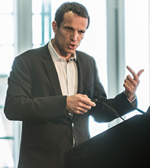Chair: Lisa Jack, Professor of Accounting, University of Portsmouth
 Lisa Jack is Professor of Accounting in Portsmouth Business School and currently president of the British Accounting and Finance Association. Her book, Accounting and Social Theory: An Introduction was published in late 2016 and with Alan Coad and Ahmed Kholeif she co-edited a special issue of Accounting, Auditing and Accountability Journal on Strong Structuration Theory in Accounting Research published in October 2016. She is also the co-editor of The Routledge Companion to Accounting Communication (2013) with Jane Davison and Russell Craig.
Lisa Jack is Professor of Accounting in Portsmouth Business School and currently president of the British Accounting and Finance Association. Her book, Accounting and Social Theory: An Introduction was published in late 2016 and with Alan Coad and Ahmed Kholeif she co-edited a special issue of Accounting, Auditing and Accountability Journal on Strong Structuration Theory in Accounting Research published in October 2016. She is also the co-editor of The Routledge Companion to Accounting Communication (2013) with Jane Davison and Russell Craig.
Lisa began her career as a graduate trainee with Eastern Electricity and then as a trainee auditor with Ernst & Whinney (now Ernst & Young) in Ipswich. Subsequently, she worked as an internal auditor in local government and higher education where she gained experience in the investigation of irregularity and fraud. After 10 years auditing, she moved into teaching professional accountancy and management programmes, becoming a qualified teacher as well as a qualified accountant. She gained her PhD in 2004, for which she won the Coleman Prize awarded by the Association of Business Historians for the best thesis on a business history topic in the UK, and embarked on an academic research career.
She is part of the MSc Forensic Accounting teaching team at Portsmouth, and leads the unit on Financial Crime and the Law. Her particular research interest is in accounting and management control in the food and drink industry, and she is now combining both interests to establish projects on fraud detection in the food industry.
Session 1: Prof Ian Charles, Director, Quadram Institute
 Ian returned to the UK from Australia where he was Director of the ithree institute, University of Technology, Sydney to take up his role as Director of the Institute of Food Research and Founding Director of the Quadram Institute in May 2015.
Ian returned to the UK from Australia where he was Director of the ithree institute, University of Technology, Sydney to take up his role as Director of the Institute of Food Research and Founding Director of the Quadram Institute in May 2015.
Ian has over 30 years’ experience in academic and commercial research. His academic career has included being a founding member of The Wolfson Institute for BioMedical Research at University College London, one of the UK’s first institutes of translational medicine. He has worked in the pharmaceutical industry at Glaxo Wellcome, and has founded biotech companies in the area of infectious disease, including Arrow Therapeutics, sold to AstraZeneca in 2007, and Auspherix, a venture capital backed company founded in 2013.
Ian is an internationally recognised scientist and has expertise in infectious diseases, the microbiome, and its impact on health and wellbeing, genomics and metagenomics.
Abstract: ‘To be or not to be, that is the question’. Shakespeare’s Hamlet addresses life, death and the nature of existence.
Quadram Institute is interested in these big questions, especially in relation to the question of how microbes survive and grow in the context of the food chain. Particularly important for health and the development of future foods is how the microbes we ingest impact the gut microbiome; what are the conditions that support microbial survival and what conditions can lead to their death?
Better understanding of the fundamental factors influencing life and death in bacteria is vital to keeping food safe, reducing antimicrobial resistance and supporting innovation in the food industry.
Session 2: Professor Seamus Fanning, Director of the UCD Centre for Food Safety
 Professor Fanning was appointed to the Chair of Food Safety & Zoonoses at University College Dublin in 2002. He is attached to the UCD Public Health, Physiotherapy & Sports Science. He holds a PhD degree in molecular microbiology.
Professor Fanning was appointed to the Chair of Food Safety & Zoonoses at University College Dublin in 2002. He is attached to the UCD Public Health, Physiotherapy & Sports Science. He holds a PhD degree in molecular microbiology.
Currently, his research interests include the application of molecular methods to food safety, applied to the control of zoonotic food-borne bacteria and the protection of public health. A significant part of his work is related to the use of whole genome sequencing strategies to describe environmental niches in the food production environment; tracking pathogens of importance to human health and characterisation of the genetic mechanisms contributing to multi-drug resistance emerging in bacteria of food-producing animal and human origin.
Professor Fanning is the Director of the UCD-Centre for Food Safety (UCD-CFS) and has also served as an expert member of a number of WHO/FAO expert groups.
Professor Fanning is a member of the editorial boards of four International journals, Applied & Environmental Microbiology; Foodborne Pathogens & Disease; Journal of Food Protection; Microbial Drug Resistance; and an Editor of a further two journals Research in Microbiology & FEMS Microbiology Letters.
Presenting on: Use of next-generation sequencing technologies will enable the food industry to better evaluate risk associated with bacterial hazards of importance to human health
 Session 3: John Graydon – Portfolio Development Executive, Siemens
Session 3: John Graydon – Portfolio Development Executive, Siemens
Having worked his early years in food manufacturing working directly on R&D, quality and production John now specialises in the field of software solutions to support the industry. These solutions typically bridge the gap across different systems to facilitate greater collaboration, increase efficiency and to improve the competitive position of businesses operating within this sector.
At Siemens for over 18 years has met challenges coming from countless different industry environments where the goal always remains the same, to generate sustainable business improvement.
Abstract: The “Digital Twin” for the food consumer: ensuring data integrity
Digitalisation brings many benefits across the supply chain, not least for the consumer who can benefit from greater visibility into the origins and history of the products they buy. With this increase in information however comes an even greater challenge to ensure that the data on which it is based is both reliable and relevant. Using the concept of the “Digital Twin”, this presentation will explain some of the principles and key technologies to support the maintenance of an accurate and true representation of a food product in the digital world.
Session 4: James Flynn, CTO and Founder, Primority Ltd
James is a Food Safety Consultant and Software Technologist, specialising in Food Safety Management systems. He has over 25 years’ experience helping food businesses solve key food safety management problems. James is the developer of the popular HACCP Now software and the architect behind Primority Ltd’s new cloud solution 3iVerify. He is also a Co-Founder of Global Food Blockchain Initiative (GFBI), where he is the Software Technology Lead. GFBI’s goal is to work with industry and academic leaders to bring together all players in the food supply chain and to understand how Blockchain technology can be used to transform food safety and transparency in food supply chain operations.
Abstract: Everything you need to know about Blockchain
Blockchain technology is being hailed as the single biggest technology revolution since the creation of the internet. It shows great promise, with applications in everything from finance, crypto currency, asset tracking and much more. In the food sector, it looks set to transform how industry solves the big problems of food supply chain traceability, authenticity, food safety and financial settlement, amongst other things.
There will be transformative opportunities, and threats, arising from Blockchain’s use by food and drinks businesses. While the technology itself is still very early stage, the pace at which it is moving is unprecedented and 2018 will see the first mainstream applications of truly global Blockchain solutions affecting many food producers, processors, importers and retailers.
In this talk, the Speaker will cover how the Internet of Things, RFID and Blockchain technology have the potential to create disruptive and transformative innovation. He will illustrate why industry needs to be informed, educated, and most of all, “Blockchain ready” and will debunk some common myths and discuss the key principles industry needs to be aware of. Starting with what Blockchain is and how it works, the presentation will highlight where Blockchain is already being applied to real world food and drink supply chain problems and look at some of the opportunities and threats Blockchain technology presents in 2018 and beyond.
 Session 5: James Stafford, MARKET Development DIRECTOR RFID, Avery Dennison
Session 5: James Stafford, MARKET Development DIRECTOR RFID, Avery Dennison
James Stafford has worked with Avery Dennison RBIS since 2007, leading RFID adoption within the Market Development team. James is responsible for ensuring that the solutions offered by Avery Dennison are fully aligned with the real needs of the market, with particular emphasis on food manufacture and retailing. Since joining Avery Dennison, James has worked with retailers in Europe, USA, Far East and South Africa to identify how modern information solutions, such as RFID can improve business profitability and customer service. Through his extensive work and experience, James is in a unique position to help manufacturers and retailers build a robust and reliable business case to justify their investment in new technology.
Prior to joining Avery Dennison, James built his experience in retail buying, with a specific focus on Innovation and Development. He was Head of RFID for Marks and Spencer, spearheading the use of RFID item level tagging. James is a recognised authority in retail RFID and has contributed at many international conferences. In 2006 James represented UK retailing on two governments sponsored Global Watch missions to review RFID developments in Japan and the USA. James holds a BSc. honours degree in Food Technology from the University of Reading and is a Member of the Institute of Food Science & Technology.
Presenting on: RFID Tracking Technology, short term gains and long term benefits
Session 6: Professor Bob Stevens Professor of Smart Materials and Devices, Nottingham Trent University

Bob Stevens is Professor of SMART Materials and Devices in the School of Science and Technology at Nottingham Trent University (www.ntu.ac.uk ) and co-founder of the Global Food Blockchain Initiative (www.globalfoodblockchain.org). Previously, principal scientist at the Science and Technology Facilities Council UK, where he was responsible for process developments in micro and nanotechnology. He has founded and co-founded six companies, including Oxsensis Ltd, The Electrospinning Company Ltd, and Nano Products Ltd. He provides scientific consultancy to industry through SMART Materials and Devices Ltd and has secured intellectual property rights which are exploited by founded companies as well as ESP Technology Ltd and Puridify Ltd. The latter being acquired by GE Healthcare in 2017. His research group collaborates with UK industry to develop and characterise electronic printing inks used to make advanced flexible hybrid electronic and optoelectronic devices including RFID, NFC and LED labels. One format is in-mould labels (RFID-IML) which have been loaded by standard robotic handlers into injection mould cavities to produce plastic pots with integral RFID antennas and integrated circuits within the wall of the packaging. This technology can be used to produce smart food packs which are programmed at the point of fill to support an immutable Global Food Blockchain He leads a life sciences research programme which is applying robust engineering techniques to manufacture complex tissues and prostheses. Target applications include implantable prostheses to help repair spinal cord damage and tissue to help develop drugs to treat Parkinson’s disease.
Abstract: Embedded RFID on pack technology
Low cost smart hybrid labels are set to transform food supply chains. Delivering safer food whilst creating a diverse range of attractive and beneficial consumer experiences. Watch out for the light flashing food packs that know where they’ve come from, what’s in them and they know where they are going.
Maintaining high productivity, whilst introducing a new and disruptive feature to conventional food packaging manufacturing lines is demanding. However, Nano Products has developed a drop-in technology which will allow injection moulded packaging to become SMART with minimal disruption to manufacturing flows. High speed printing of highly conductive inks on polypropylene film has been the focus of Nano Products research over the past 5 years. The outcome of our research and development is a printing system which is able to define UHF/HF antennas for RFID and NFC labels and electrodes which are able to connect to sensors and/or light emitting diodes to allow labels to light up. The system has produced conductive circuits at print speeds of 100m/min. One key feature of Nano Products technology is the avoidance of a high temperature sintering step, commonly adopted by companies commercialising printed electronics. The low processing temperature allows the thin polypropylene substrates used to form In-Mould Labels [IML] to be used for flexible RFID antennas. Subsequently allowing UHF RFID-IMLs to be produced to allow SMART solid packaging to be manufactured. As a co-founder of the Global Food Blockchain Initiative, Professor Stevens is applying his skills and networks to bring together multi-disciplinary teams of scientists and technologists who want to make a substantial difference in food safety.
 Session 7: Vincent Doumeizel, Vice President Food & Sustainability, Lloyd’s Register (LRQA)
Session 7: Vincent Doumeizel, Vice President Food & Sustainability, Lloyd’s Register (LRQA)
Following a degree in economics, Vincent worked for the French government in Africa on a number of agriculture projects; he also carried out humanitarian work in the Middle East and Africa.
Vincent Doumeizel joined Lloyd’s Register in 2014, as Vice President for Food & Sustainability at group level over 100+ countries and tens of thousands clients.
Vincent also supports actively the charitable objectives of the Lloyd’s Register Foundation (LRF), notably through the identification & funding of innovative projects to mitigate food insecurity as well as through participation to Advisory Boards in various food universities research projects across Europe
He contributed to the latest LR Foundation Foresight Reviews of Resilience Engineering as well as Blockchains and is a regular speaker at some of the world’s leading events including COP (United Nations) and the Global Food Safety Conference.
Abstract: The future of food audits
The global food supply chain is evolving through greater transparency driven by consumer demand, new regulations such as FSMA advances in technology and new products and services. But what does the future hold for a safer and more sustainable food supply chain?
What impact will big data, blockchain technologies and Next Gen Sequencing have on food traceability? Will these new technologies enable real time monitoring of the entire supply chain? How they will integrate within the new FSMA regulation? How will what we eat change to become more sustainable and safer? What impact will digitalisation have on audit business models and second party audits to help clients better protect their brands? Ultimately, how will we ensure that consumers are confident that what they are eating is responsibly sourced and safe for them and the planet?
 Session 8: Brian Courchesne, Global Director, Cybersecurity and Industry Services Marketing, Schneider Electric
Session 8: Brian Courchesne, Global Director, Cybersecurity and Industry Services Marketing, Schneider Electric
With almost 40 years experience in applying IT solutions to business problems, Brian brings a well-rounded perspective to the challenges and opportunities facing today’s business world. As Global Director, Cybersecurity and Industry Services Marketing for Schneider Electric, he provides marketing support for Industrial process automation services that provide value across the operational lifecycle, from consulting and planning through performance services to maintenance and support. Brian is also responsible for defining and communicating his company’s position and capabilities to provide unique cybersecurity solutions for customer problems.
While there are many common cybersecurity threats across industrial sectors, there are also unique challenges for Food and Beverage. Brian’s experience has given him a broad outlook on the application of technology to solve business problems. Schneider Electric’s diverse capabilities and customer base provides a unique backdrop to understanding the rapidly evolving cybersecurity landscape and solution approaches.
With a diverse background in Management, Consulting Services, Sales, Marketing, and Product Development, Brian brings extensive experience and perspective on addressing business challenges.
Abstract: Why cybersecurity matters in the food and beverage sector?
It seems that each day brings new stories about sensational cyber-attacks in some part of the world. While critical infrastructure industries get a lot of attention, the Food and Beverage sector has its own special challenges in protecting against these growing threats. And some of the challenges, and solutions, may not be so obvious. This session will review some fundamental approaches to understanding, and battling cybersecurity threats.
 Session 9: Rob Chester, Managing Director of Food Safety, NSF
Session 9: Rob Chester, Managing Director of Food Safety, NSF
Rob leads NSF International’s food safety services and operations in the UK. Prior to joining NSF he worked for Walmart in the UK, the US and China. Whilst in China he was the Chief Compliance Officer, whilst in the US he ran Operations Compliance across Walmart’s 5000 US stores. Prior to Walmart he held several compliance roles globally for Tesco. He holds an LLB and Postgraduate Diploma in Legal Practice from UCLAN in the UK. He lives in the UK with his wife and three Rhodesian Ridgebacks.
Abstract: The world through the auditor’s eyes – Alternative global auditing solutions
Despite concerted efforts over the years, food safety issues remain. Many people consider technology will bring the answers that the industry needs. Broadly I feel that is true, however there is a need to increase the speed at which the food industry develops these solutions. I talk about several of the solutions that I feel are going to change the industry. I end by stressing that technology is not a panacea. Culture remains a significant challenge, and without tackling that, technology will always be challenged.
 After Dinner Speaker - Chris Barnatt, Futurist - ' What Will The Food Industry Look Like in 2030'
After Dinner Speaker - Chris Barnatt, Futurist - ' What Will The Food Industry Look Like in 2030'
Christopher Barnatt is a futurist, keynote speaker and freelance academic. He has published thirteen books and numerous articles, with over 200 media contributions to broadcast, print and online programmes and publications. He runs the websites ExplainingTheFuture.com and ExplainingComputers.com, as well as associated YouTube channels that have received over 37 million video views.
For 25 years Christopher lectured in computing and future studies in Nottingham University Business School, where he spent seven years as Director of Undergraduate Programmes. He now delivers presentations and consultancy for a wide range of organizations in sectors that include food production, financial services, healthcare, logistics and the arts.
SPONSORS
Prime Sponsor:

Secondary Sponsor:


